INTRODUCTION
![]() This piece is prompted by the ‘Welsh Government’ suggesting it wants to address the issue of lobbying. As the website puts it: “The Standards of Conduct Committee is undertaking an inquiry into lobbying and is keen to establish whether lobbying is a matter of concern to the people of Wales”.
This piece is prompted by the ‘Welsh Government’ suggesting it wants to address the issue of lobbying. As the website puts it: “The Standards of Conduct Committee is undertaking an inquiry into lobbying and is keen to establish whether lobbying is a matter of concern to the people of Wales”.

A disingenuously worded paragraph because the hope is that few people will even know about the exercise, fewer still will respond, and that will allow the self-styled ‘Welsh Government’ to claim that lobbying is not “a matter of concern” and everything can just carry on as before.
The truth is that Wales desperately needs reform in this area, and it needs to go well beyond a simple register of lobbyists. I say this because lobbying takes a different form in Wales to most other Western countries.
What I’m going to try here is to give examples of different lobbying sectors (that would probably not regard themselves as lobbyists), while also looking at more obvious examples of lobbying.
I warn you, this is a ‘biggie’, pushing 4,000 words. But broken up into sections so you don’t have to take in the full horror of the situation all at once.
So go make a cuppa.
◊
THE ENVIRONMENTAL LOBBY
Since before the first elections to the then Assembly for Wales in May 1999, those looking to benefit from devolution were positioning themselves, even relocating.
For example, the RSPB, which had until then been based – very centrally for an essentially rural organisation – in Powys, decided the time had come to move its Wales regional office to Cardiff.
This had nothing to do with bird migrations, or even the rediscovery of the Lesser-spotted Splott Warbler (previously thought extinct).
No, it was all to do with access to the new decision makers.
For the RSPB and the wider environmental lobby, devolution has been like Christmas, with a constant supply of prezzies delivered by yo ho ho-ing politicians.
Just cast your mind back to last week’s post on this blog, ‘Saving Wales From the Welsh’. One of the organisations mentioned was the Wales Environmental Link (WEL). And I reproduced the panel below, from the Charity Commission website.
Focus on the section I’ve highlighted.

“At the centre of government decision making” can only mean that the WEL lobbies to influence decisions made by the ‘Welsh Government’.
But do you remember voting for the Wales Environmental Link? Do you remember being offered the chance of voting for the Wales Environmental Link? No, nor me.
As I say, the ‘Save the Planet!’ lobby was out of the blocks early on in the devolution era. Helped to a great extent by ‘insiders’. These came in two forms.
First, civil servants, often from England, always answering to London, and working to a vision of a Welsh countryside without farming.
Second, politicians who, despite what they were elected and paid to concentrate on, always prioritised their real interest of ‘reconfiguring’ – even repopulating – rural Wales.
Inevitably, the two elements worked closely together. Never more so than when Minister for Rural Affairs and North Wales* Lesley Griffiths shacked up with her civil servant adviser Gary Haggaty.
But the grande dame of the sector is Jane Davidson. “Minister for Environment and Sustainability from 2007 to 2011 where she was responsible for the Welsh Government agreeing to make sustainable development its central organising principle”, as Wikipedia tells us.
Sustainable development became the “central organising principle” of governing Wales. Let that sink in.
After leaving the Assembly in 2011 Davidson took up a post of Director of the Wales Institute for Sustainability at Trinity St David University, Lampeter.
Davidson was, supposedly, Assembly Member for Pontypridd, but she’d already bought a place down west and was more concerned with pushing through the Hippies’ Charter (One Planet legislation) than with anything happening in Ponty.
From ivory tower to organic cabbage patch Jane Davidson and those she can marshal and organise have wielded an unhealthy influence over successive administrations in Corruption Bay.
The environmental lobby is now one of the most powerful in Wales. It’s why farmers have their backs to the wall, it’s why the M4 was not improved, and why smaller projects, such as the Llanbedr by-pass, have been scrapped.
If this lobby could close Port Talbot steelworks, take away our cars, confiscate all farmland, and turn us into vegans, it would. And the ‘Welsh Government’ would pass the necessary legislation without quibbling.
As gesture politics go, few things are more damaging to the Welsh national interest than deluding yourself that you’re saving the planet while damaging Wales.
*A bizarre title that makes ‘North Wales’ sound like an overseas colony of Corruption Bay.
◊
THE RACE LOBBY
At it’s crudest this is little more than, ‘You Welsh are racist – give us funding’. I examined this racket not so long ago, when the so-called Welsh Arts Anti-Racist Union successfully blackmailed the Wales Arts Council and the National Museum.
If you have the stomach for this tale of extortion and cowardice, then read, Corruption Bay and a tale of Cymrophobia (23.08.2021), Arts Council of Wales and Welsh Arts Anti-Racist Union, an update (31.08.2021), and Welsh Arts Anti-Racist Union Unmasked (06.09.2021).
In brief, the Arts Council of Wales was pressured into ‘commissioning’ a report from the Welsh Arts Anti-Racist Union. An ad hoc group capitalising on the George Floyd killing by using ‘discrimination’ as the key to future funding.
In the race lobby sector we find another grande dame, in the form of Rose Mutale Nyoni Merrill, who you can read about in the first section of this miscellany from May 2018.
Her empire is founded on Bawso, which has accumulated quite a few properties around Wales over the years. And you’ll be glad to hear that Mrs Merrill has not neglected her own property portfolio.
But that’s how it is in the ‘Welsh’ Labour Party. You work for and promote the party, and preferment and funding will be your reward. Even if it’s public money down the drain.
And the showering of goodies can extend to your loved ones, involved in other fields.
As happened with Travers Merrill, Mutale’s hubby; given the cushy number of chief executive at Rhondda Life, a ‘regeneration’ project in the Rhondda Fach. What could possibly go wrong?
Everything, by the look of it.
It 2012 it was announced that the project was in receivership. And having looked through the documents filed with Companies House I get the impression there was something akin to jiggery-pokery going on in Ferndale.
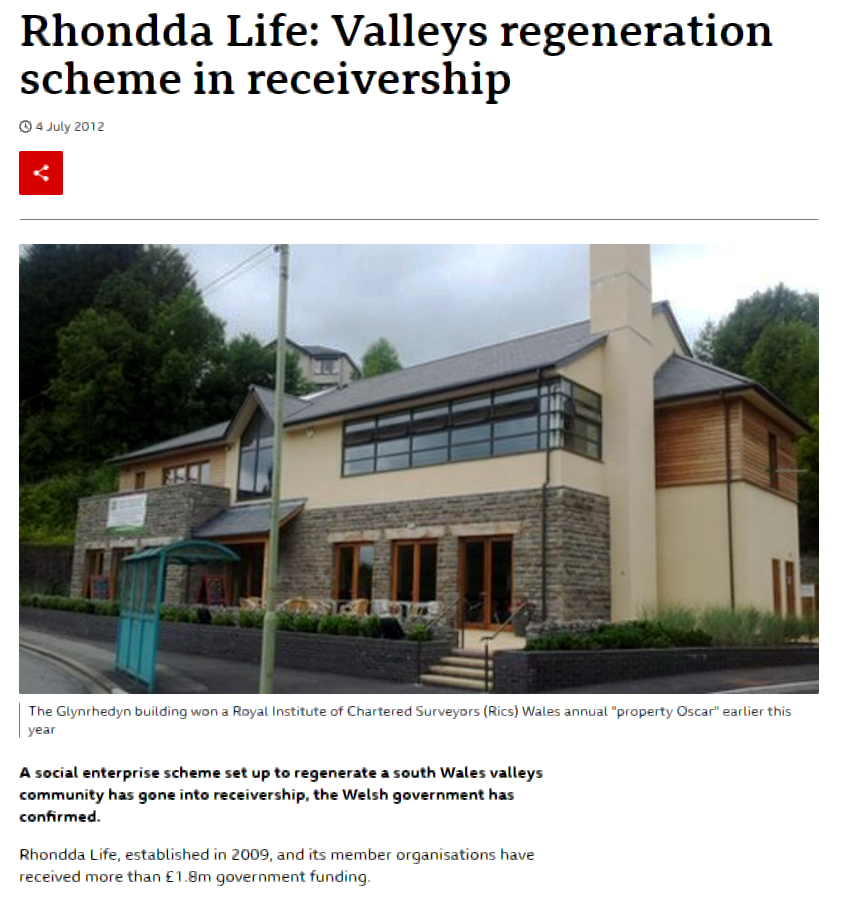
For example, in the last accounts filed, for y/e July 31, 2012, the company is said to own freehold property valued at £1.5m. This is presumably the building you see in the image above.
The property eventually realised £295,000. Even allowing for the way liquidators dispose of such properties, that is quite a difference. But the bottom line is that the building was never worth £1.5m.
Over-valuing assets is a tactic used by many who’ve appeared on this blog over the years: money launderers, mortgage fraudsters, and other crooks.
(There is an obvious link in terms of directors between Rhondda Life and Blaenllechau Community Regeneration, which went belly-up around the same time.)
But of course, this being Wales, a ‘Welsh Government’ cock-up leads to a cover-up. It was years before the truth started coming out. Due in no small part to the persistence of Leanne Wood, a politician for whom I have the highest regard.
(Keyboard explodes!)
◊
THE HOMELESSNESS LOBBY
A few years back I submitted an FoI request asking about organisations in Wales “combatting homelessness”. Specifically, how many were there?
The response told me there were 48! In a country of just over 3 million people. There are probably more by now. “It’s them wicked Tories, innit”.
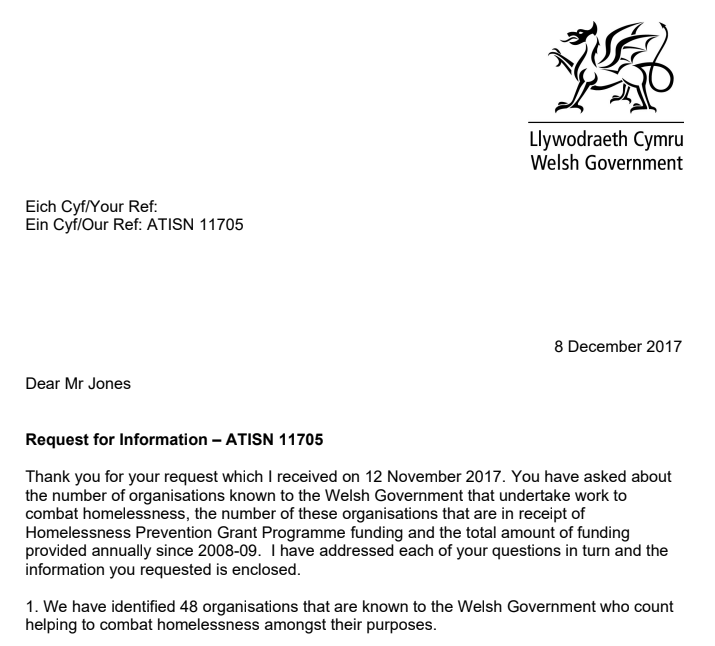
But then, when you think about it, when you remember the kind of country Wales is, and the kind of lobbying I’ve described, 48 shouldn’t surprise anyone. The more the merrier. It’s only public money after all.
As with the other sectors, many of the homelessness racketeers have moved to Wales in the era of devolution. Which is bad enough, but to keep the funding flowing these people – just like their counterparts in other sectors – will import a steady stream of ‘clients’ from over the border.
It’s a form of human trafficking.
We see here the fundamental and uncomfortable truth about third sector lobbyists in Wales.
Identify or invent a ‘problem’ in order to get funding. Then, with the help of an ever-compliant media and understanding politicians, the ‘problem’ must persist – to guarantee continued funding!
Let the good times roll!
Many of those now running the dozens of homelessness organisations have worked for the Labour Party or for Plaid Cymru, others will move on to work for these parties.
Or join some other publicly-funded gravy train.
To get a taste of what I’ve written over the years on this subject try, ‘Another “homelessness” outfit!’ (16.04.2020). Or just put ‘homelessness’ into the search box on top of the sidebar to open up a library.
◊
THE “WOMEN WITH PENISES” LOBBY
A relatively recent arrival on the lobbying scene in Wales is the transsexual lobby. Represented by Stonewall, the former lesbian and gay organisation.
To begin with, and as you’ve probably guessed, Stonewall has its claws into the ‘Welsh Government’ for funding. The panel below shows that in the 18 months up to March 31, 2021, only the UK government gave more money to Stonewall than the boys and girls of Corruption Bay.
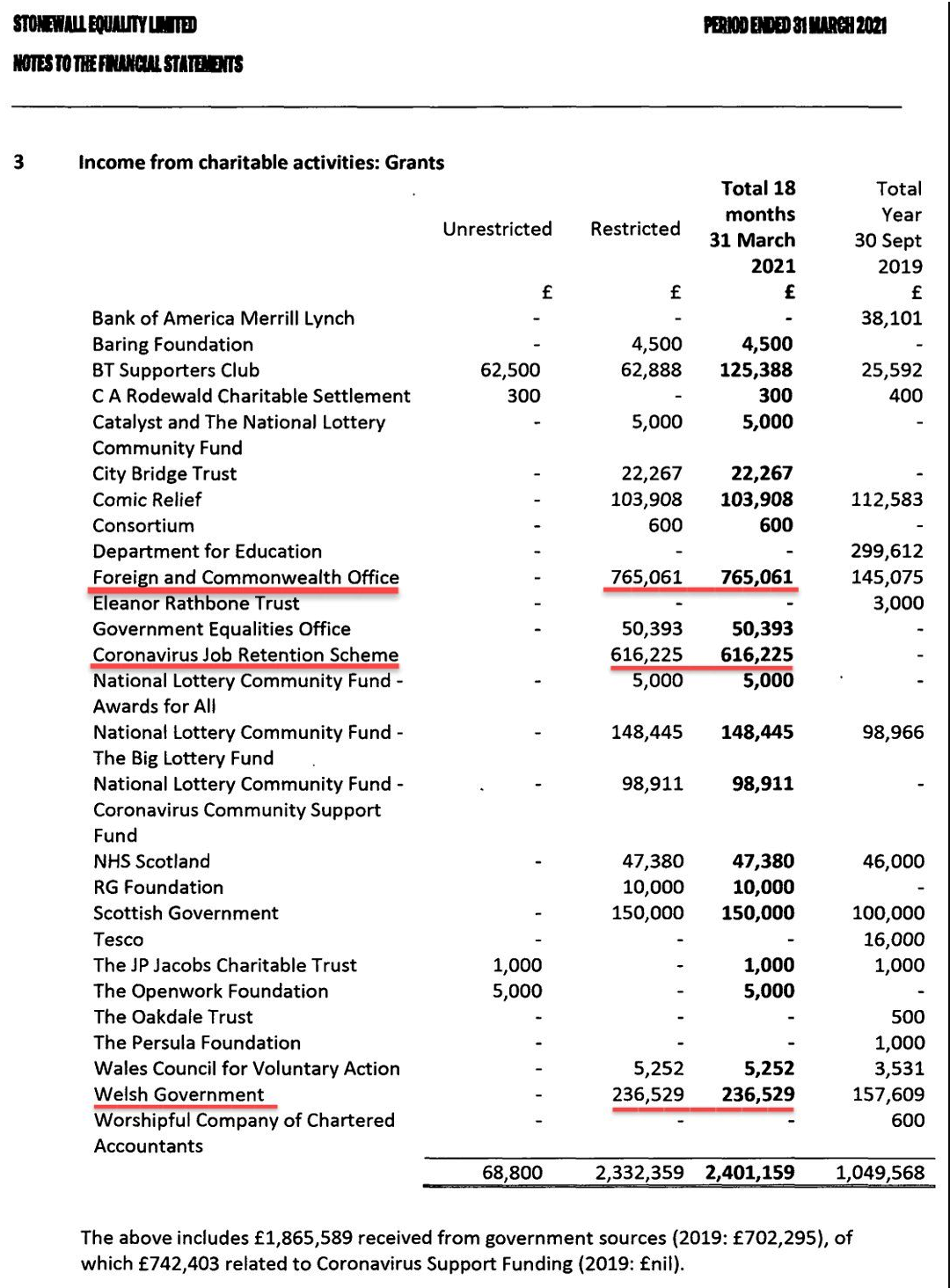
But this being Wales, Stonewall has also been able to influence – if not dictate – legislation. To the extent of the ‘Welsh Government’ agreeing to what Stonewall would like to see in law rather than what the 2010 Equalities Act actually says.
As Irving Berlin put it: There May Be Trouble Ahead.
Especially after First Minister Drakeford made an ass of himself. You used the term, so tell us, what is a, “transgender woman”?
It appears that the voice of Stonewall in Wales is Lu Thomas. You’ll have noticed her name if you followed the links in the section on the race lobby. She’s a Labour insider with far too much influence in the Bay.
As I suggest, she was deeply involved, with her business partner, Jon Luxton, another Labour insider, in the Welsh Arts Anti-Racist Union scam.
Her Linkedin profile says she’s managing director of Final Say Wales, which seems to be a rather sad attempt to roll back Brexit. I dug this out, but I couldn’t find much more. My guess would be it’s died a natural death in the face of reality.
The other outfit mentioned on her Linkedin page is Re:cognition. An odd fish, this; not least because there’s a reputable company with a very similar name.
Lu Thomas was previously director of a company known as Cognition Training Ltd, along with Jon Luxton. This went into liquidation in December 2018 owing close on £35,000, most of it to the tax man.
The latest incarnation, Re:cognition Training CIC has only Luxton as a director. So is Lu Thomas an employee?
Whatever the answer, through political connections Re:cognition gets commissions from the ‘Welsh Government’.
For as the latest accounts tell: “We chaired and developed an LGBTQ+ strategy for Welsh Government where we managed the LGBTQ+ stakeholder group, ensuring voices from across wales (sic) was heard.”
But I bet that only certain voices were allowed to be heard.
And you won’t be surprised to learn that Re:cognition has also been given a gig by Labour-controlled Cardiff City council.
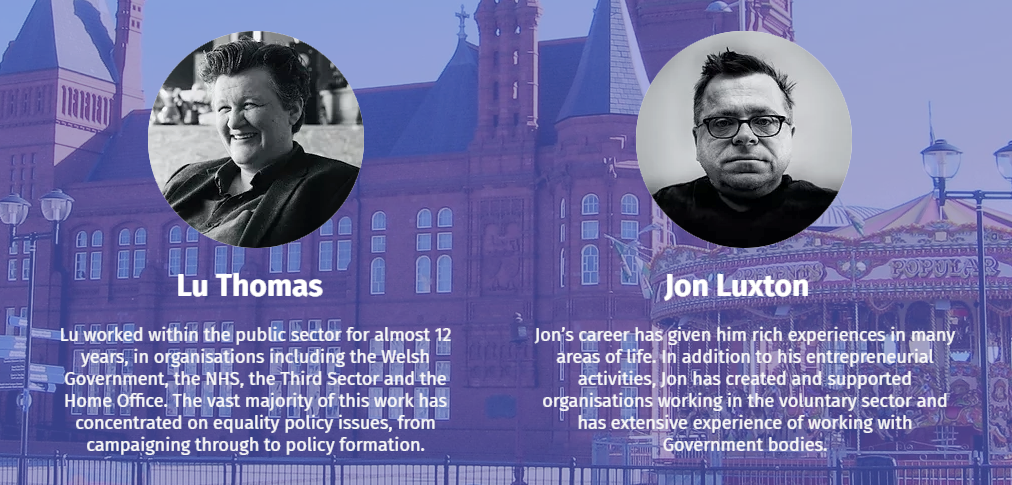
This probably helped inform the ‘Welsh Government’s current – and possibly unlawful – position on “trans rights”. But then, when it comes to surveys, it all depends who you talk to.
What Lu Thomas and others have learned from many years of working with and influencing politicians is that if you put your mind to it you can find racism, environmental damage, transphobia, etc., etc., just about anywhere.
And then you can capitalise on your ‘find’.
◊
THE REFRESHINGLY HONEST AND CORRUPT COMMERCIAL LOBBY
Those we’ve looked at so far have been insiders, dealing with civil servants and politicians they know. These activist-lobbyists have, in a number of cases, previously worked for the ‘Welsh Government’, or for individual politicians.
They are invariably associated with not-for-profit organisations. Which means few jobs for anyone not linked to a particular clique of insiders, and little by way of a contribution to the wider economy beyond the increased spending power of clique members.
But we are asked to ignore this and focus instead on the incalculable benefits to society as a whole from ‘doing good’.
Though I fail to understand how a Welsh community is improved by a third sector body or a housing association importing into that community from England ex-cons, petty criminals and drug addicts.
Nor do I pretend to understand the doublespeak that gave us a policy (OPDs) designed, we were told, to reduce Wales’ carbon footprint . . . that invites into Wales people to live on previously unused land; who drive elderly diesel vehicles, keep farting animals, and cannot live without wood-burning stoves.
It’s refreshing then to be able to focus on a lobbying activity motivated by unalloyed greed and promoted through in-yer-face corruption. Though it adheres to the model herein explained in that it is facilitated using Corruption Bay insiders.
I’m referring now to the many, many companies under the Bute Energy umbrella, and their plans for at least 20 new wind farms in Wales. Shown in red print in the map below.
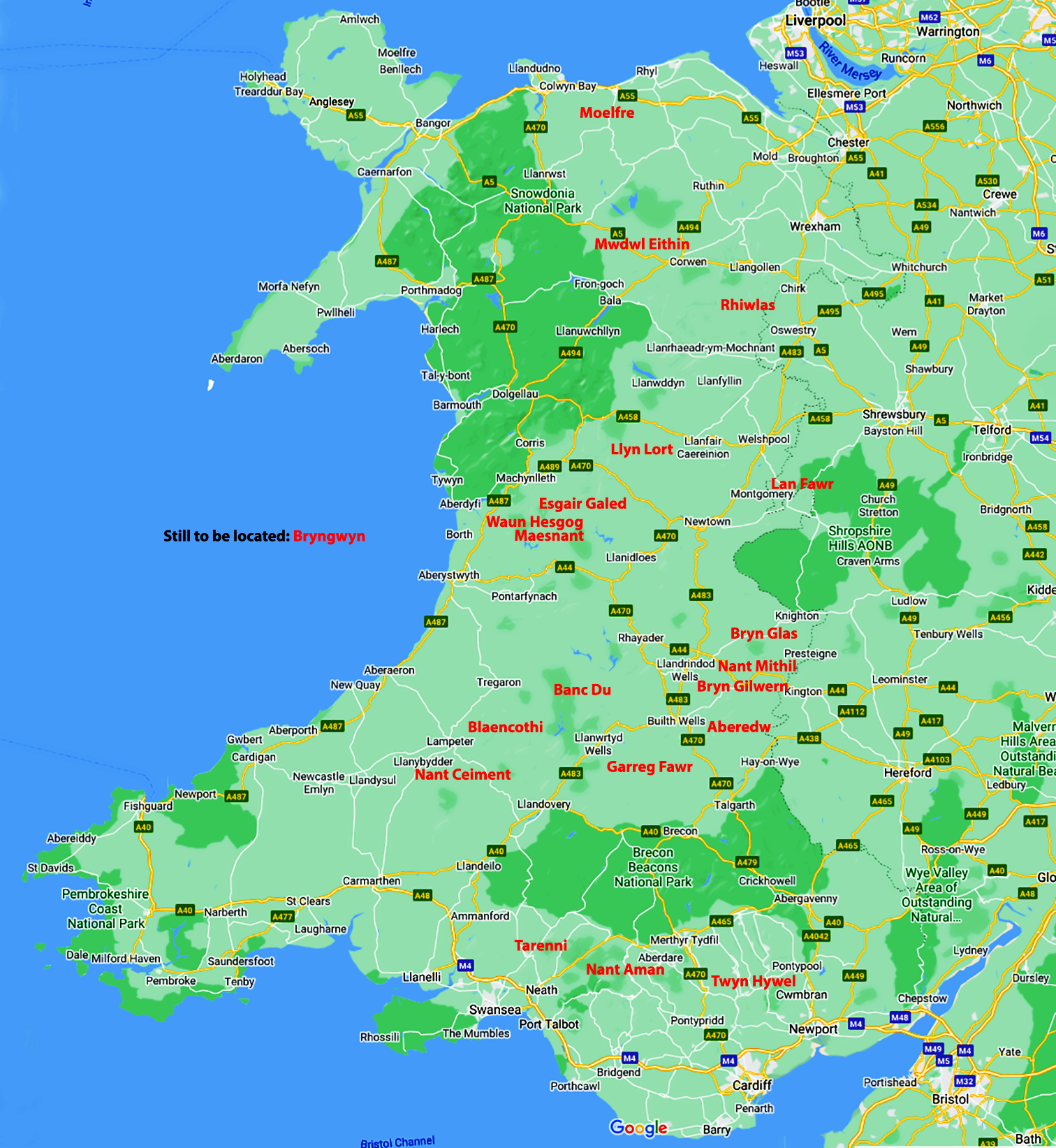
Here’s a pdf document listing the companies I’m aware of, but new ones are being formed all the time. (The company names are hyperlinks.)
To understand the brazen corruption involved you’ll need a few introductions. Let us look first at Bute Energy’s ‘Welsh Advisory Board’. A totally unnecessary group formed purely to justify paying certain people for their influence with the ‘Welsh Government’.

On the left, we see Derek Vaughan, former Labour MEP. Not known to have any knowledge of or interest in wind turbines or renewable energy of any kind.
On the right is John Uden, partner of Labour MS, Jenny Rathbone, who sits on the Senedd’s Climate Committee. His knowledge of three-arm bandits is believed to be on a par with Vaughan’s.
The other two may be there to act as a distraction. The jury’s out on them. Though I’m told ‘John Cwmbetws’ already has a bloody big turbine on his land.
UPDATE 17.06.2022: John Davies is of course Chairman of the Board of Directors of the Royal Welsh Agricultural Society. Which makes him an ideal influence within the farming community, and he might even be able to find sites for Bute.
Indeed, a beneficiary of the planned Moelfre site is vice-chair of the Board, Harry Fetherstonhaugh.
But of even more interest is David James Taylor, who has served as a spad to former First Ministers Rhodri Morgan and Carwyn Jones, and also former Secretary of State for Wales, Peter Hain. Quite the lad about the corridors of power, our Dai.
Taylor tends to work under the radar and is nowhere mentioned on the Bute website. But he, like Vaughan and Uden, was recruited by Bute Energy for one reason and one reason only – his contacts in the Labour Party.
He holds shares in Bute company, Windward Enterprises Ltd, both in his own name and that of his company Moblake Associates Ltd. Taylor was also – until people noticed – a partner in another Bute company, Grayling Capital LLP.
His lucre from Bute Energy was channelled through Moblake Ltd. This company was wound up in April with sole director Taylor owing the company £605,872 that he’d taken out in interest-free ‘loans’ with no repayment date.
But no mention of where the money came from!

Taylor has set up a new company, Earthcott Ltd, so maybe Bute’s future payments will be channelled through this new venture. Then again, seeing as we know about it . . .
I won’t go over any more old ground, it’s all covered in previous pieces on this blog such as ‘Corruption Is Such An Ugly Word . . . But I Can’t Think Of Anything Else To Call It!’ (06.12.2021), and ‘Bute Energy Selling Wales For Danegeld‘ (21.02.2022), in which I explain how Scottish company Bute Energy has linked up with Danish investors.
Yes, folks, Scots, Danes, everyone gets a slice of the action, except the native Welsh. Unless of course you’re well connected down Corruption Bay.
That’s how a corrupt, third world country operates.
◊
THE PROFESSIONAL LOBBYISTS
In addition to those already looked at, who might be termed ‘amateur lobbyists’, there are also companies that are quite open about what they do. Which is, helping commercial outfits, often from outside of Wales, get what they want from the ‘Welsh Government’.
But they also dabble in politics. And for unregulated bodies they have far too much influence.
Let’s just look at two of them.
Starting with a company that’s appeared on this blog a number of times, Deryn Consulting. Run by former politicians and spads, but keeping up with the Woke agenda by recruiting enviromarxists and promoters of BLM.
The majority of Deryn’s shares are owned by former Labour spad Cathy Owens, with a minority nestling in the neatly-manicured hands of former Plaid Cymru Welsh Assembly Member Nerys Evans.
Over the years Deryn has been involved in a number of unsavoury incidents, I’ll just mention two.
The first was the Ofcom contract, a gem of its kind. This report from October 2017 will give you the story. And the image below of a WalesOnline headline from August 2017 leads on to another element of the Deryn saga.

You’ll see that Neil McEvoy, was at that time, still a Plaid Cymru AM, but he’d blotted his copybook big time by challenging third sector shenanigans and exposing Deryn.
For party leader at that time was Leanne Wood, a personal friend of those whose lives were being made difficult by Neil McEvoy. He’s told me more than once that he was ordered to lay off Deryn. He didn’t.
He was too honest to stay silent when surrounded by institutionalised corruption, and so he had to go. First from Plaid Cymru, and then from the Senedd.
Around the time of the Ofcom scandal people at Deryn were briefing against Carl Sargeant, Cabinet Secretary for Communities and Children in the ‘Welsh Government’.
Those at Deryn employed in this dirty work were colluding with over-wrought but ever-cooperative third sector women. Some of whom had also made unfounded allegations against Neil McEvoy.
What’s worse, there were politicians, supposed allies of Sargeant, also briefing Deryn. The conduit here was Jo Kiernan, former senior spad to First Minister Carwyn Jones.
From Carwyn Jones’ staff Kiernan knew that Carl Sargeant was to be sacked before the poor bugger himself knew, and she was briefing others.
Carl Sargeant was sacked on November 3, 2017 and took his own life four days later.
As I was writing this I got to wondering about the Deryn finances, and so I went to the Companies House website. Where I found the latest accounts. Or rather, the unaudited financial statement up to December 31, 2020.
This skeletal document tells us that Deryn, with 9 employees, has assets of just £63,836.
But where are the real figures? Where’s the rest of the money? Where’s the turnover for the year? Is everything done with brown envelopes?
There’s something squalid and distasteful about Deryn. More worrying is that Owens, Evans and Kiernan seem able to open any door in Corruption Bay.
The bad news is that Deryn isn’t the biggest PR company down the Bay. The big kid on the block now is Camlas, formerly Positif Politics Ltd. The change of name last November is linked to the departure of Positif founder Daran Hill, who ceased to be a director in September. (Though he still seems to hold a majority of the shares.)
I’ve heard rumours, involving the local gendarmerie; but you know me, I try to avoid tittle-tattle in favour of facts and informed speculation.
Back in August 2020, in the early days of investigating Bute Energy and David Taylor, I ran across Hill’s name in connection with a wind farm planning application, so I contacted him. The resultant Twitter exchange can be read below.
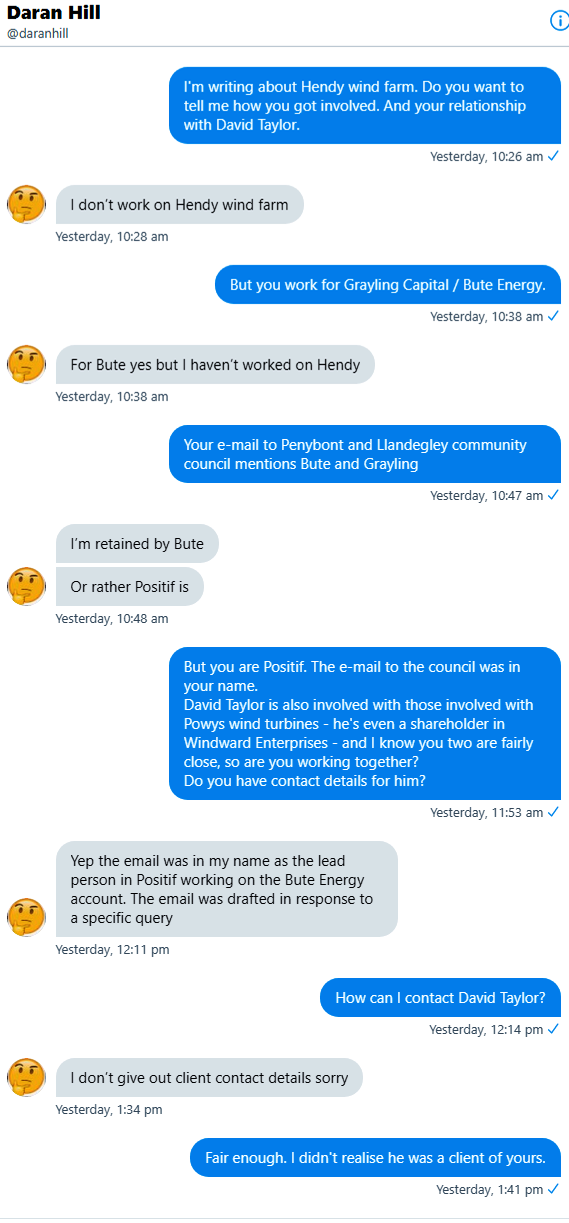
The Bute account at Camlas is currently handled by Matt Hexter.
Did David Taylor direct Bute Energy to his mate Daran Hill, or was it vice versa?
Going through who’s who at Camlas brings up the usual list of former politicians and spads, Mainly Plaid Cymru, but also Labour and now, with the recruitment of former AM, Angela Burns, the Conservative and Unionist Party is also represented.
But with Plaid Cymru firmly in control through Managing Partner and Co-Owner Rhodri ab Owen, brother to Plaid Cymru MS Rhys ab Owen; while the other Managing Director and Co-Owner Naomi Williams was a spad to former Plaid AMs Dafydd Elis Thomas and Dai Lloyd.
Plaid Cymru is of course in an alliance with the Labour Party in the Senedd. And even without an alliance, the two parties are never far apart.
Finally, and turning to Companies House, Camlas is another disappointment. All that’s filed is another bare bones ‘financial statement’.
I’m sure these minimalist filings are perfectly legal, but I believe that with companies such as Deryn and Camlas exercising unaccountable influence in Welsh public life we are entitled to know more about them.
◊
CONCLUSION
In normal countries, with normal economies, lobbying is conducted by business interests and often involves donations to political parties. In other words: lobbying decides which company or corporation gets the contracts.
And while this may be undesirable, it usually delivers jobs and generates wealth. The country benefits, the losers tend to be commercial competitors. Who, had they been successful, would also have created jobs and generated wealth.
The political elite controlling Wales wants a quasi-socialist state in which they exercise power through patronage and hand-outs. The last thing this elite wants is a decent economy and an entrepreneurial class challenging its diktats and exposing its weaknesses.
And this explains why, in Wales, lobbying takes the form of fawning and cajoling by pressure groups that share the political outlook of the elite. These demand legislation beneficial to their cause, also funding and publicly-owned assets.
This must then be disguised with flim-flam like, “public good”, “future generations”, and other specious and unquantifiable ‘benefits’. Which we are told to accept as some kind of substitute for a decent economy and a prosperous country.
◊
RECOMMENDATIONS
To begin with, we obviously need a definition of lobbying.
I would suggest: Anyone seeking to influence politicians, either directly or indirectly, through civil servants, advisers, or by any other means, in the hope of securing personal or corporate financial gain, or in order to influence legislation.
There should be a register of such persons. And a diary kept of all meetings between lobbyists and politicians, civil servants or advisers; both those meetings that have been held, and those planned for the future. The subject matter of these meetings must also be stated clearly and unambiguously.
Both the register and the diary should be updated daily and made available online.
To monitor lobbying will require a new post, and it will need to be filled by someone untainted by Corruption Bay. For once, I would have no objection to filling an important post in Wales with a complete stranger.
But I remain open to suggestion, so let’s have your comments. The ‘Welsh Government’ is also asking for your views, so don’t forget to write.
They’ll be delighted to hear from you! Or maybe not.
♦ end ♦



















